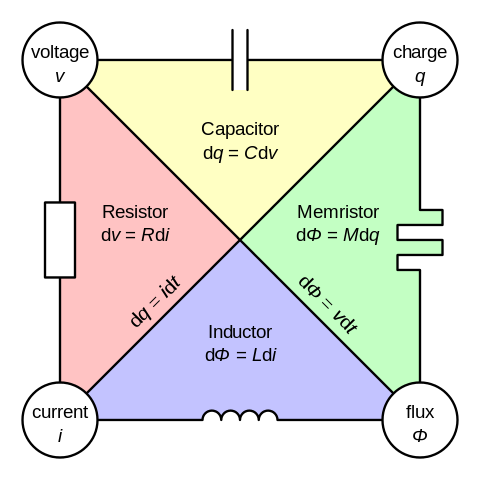The memristor (/ˈmɛmrᵻstər/; a portmanteau of memory resistor) was a term coined in 1971 by circuit
The memristor (/ˈmɛmrᵻstər/; a portmanteau of memory resistor) was a term coined in 1971 by circuit theorist Leon Chua as a missing non-linear passive two-terminal electrical component relating electric charge and magnetic flux linkage.[1] The operation of RRAM devices was recently connected to the memristor concept.[2] According to the characterizing mathematical relations, the memristor would hypothetically operate in the following way. The memristor’s electrical resistance is not constant but depends on the history of current that had previously flowed through the device, i.e., its present resistance depends on how much electric charge has flowed in what direction through it in the past. The device remembers its history—the so-called non-volatility property.[3] When the electric power supply is turned off, the memristor remembers its most recent resistance until it is turned on again.[4][5]In 2008, a team at HP Labs claimed to have found Chua’s missing memristor based on an analysis of a thin film of titanium dioxide;[8] the HP result was published in Nature.[4] The memristor is currently under development by various teams including Hewlett-Packard, SK Hynix and HRL Laboratories.[citation needed]These devices are intended for applications in nanoelectronic memories, computer logic and neuromorphic/neuromemristive computer architectures.[9]Commercial availability of memristor memory has been estimated as 2018.[10]In March 2012, a team of researchers from HRL Laboratories and theUniversity of Michigan announced the first functioning memristor array built on a CMOS chip.[11][Wikipedia]Image: Relations between the four fundamental electronic variables and devices that implement these relations. Vectorised version of File:Memristor.png by User:Linear77. By Parcly Taxel (Own work) [CC BY-SA 3.0 (http://creativecommons.org/licenses/by-sa/3.0)], via Wikimedia CommonsSee alsoWhat Are Memristors? -- source link
#circuit theory#circuits#memristor#resistor#inductor#capacitor#current#voltage#charge#electrical components
